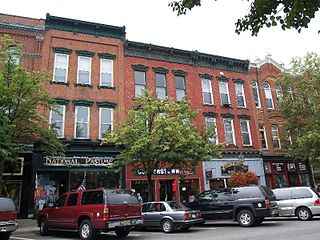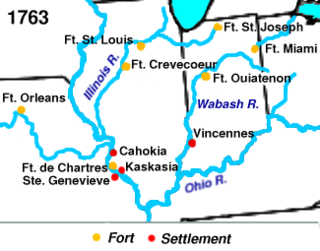
Otsego County is a county in the U.S. state of New York located within the Mohawk Valley Region. As of the 2020 census, the population was 58,524. The county seat is Cooperstown. The county's population center is Oneonta. The name Otsego is from a Mohawk or Oneida word meaning "place of the rock."

Cooperstown is a village in and the county seat of Otsego County, New York, United States. Most of the village lies within the town of Otsego, but some of the eastern part is in the town of Middlefield. Located at the foot of Otsego Lake in the Central New York Region, Cooperstown is approximately 60 miles west of Albany, 67 mi (108 km) southeast of Syracuse and 145 mi (233 km) northwest of New York City. The population of the village was 1,794 as of the 2020 census.

James Fenimore Cooper was an American writer of the first half of the 19th century, whose historical romances depicting colonial and indigenous characters from the 17th to the 19th centuries brought him fame and fortune. He lived much of his boyhood and the last fifteen years of life in Cooperstown, New York, which was founded by his father William Cooper on property that he owned. Cooper became a member of the Episcopal Church shortly before his death and contributed generously to it. He attended Yale University for three years, where he was a member of the Linonian Society.

The Province of Pennsylvania, also known as the Pennsylvania Colony, was a British North American colony founded by William Penn, who received the land through a grant from Charles II of England in 1681. The name Pennsylvania was derived from "Penn's Woods", referring to William's father Admiral Sir William Penn.

The Ohio Company, formally known as the Ohio Company of Virginia, was a land speculation company organized for the settlement by Virginians of the Ohio Country and to trade with the Native Americans. The company had a land grant from Britain and a treaty with Indians, but France also claimed the area, and the conflict helped provoke the outbreak of the French and Indian War.

The Illinois-Wabash Company, formally known as the United Illinois and Wabash Land Company, was a company formed in 1779 from the merger of the Illinois Company and the Wabash Company. The two companies had been established in order to purchase land from Native Americans in the Illinois Country, a region of North America acquired by Great Britain in 1763. The Illinois Company purchased two large tracts of land in 1773; the Wabash Company purchased two additional tracts in 1775.

The Treaty of Fort Stanwix was a treaty signed between representatives from the Iroquois and Great Britain in 1768 at Fort Stanwix. It was negotiated between Sir William Johnson, his deputy George Croghan, and representatives of the Iroquois.

General William Edmeston was a British Army officer who owned an estate in New York State.
George Croghan was an Irish-born fur trader in the Ohio Country of North America who became a key early figure in the region. In 1746 he was appointed to the Onondaga Council, the governing body of the Iroquois, and remained so until he was banished from the frontier in 1777 during the American Revolutionary War. Emigrating from Ireland to Pennsylvania in 1741, he had become an important trader by going to the villages of Indigenous Peoples, learning their languages and customs, and working on the frontier where previously mostly French had been trading. During and after King George's War of the 1740s, he helped negotiate new treaties and alliances for the British with Native Americans.

William Cooper was an American merchant, land speculator and developer, the founder of Cooperstown, New York. A politician, he was appointed as a county judge and later served two terms in the United States Congress, representing Otsego County and central New York. He was the father of James Fenimore Cooper, who became a noted writer of historical novels related to the New York frontier.
Percifer Carr was a British allied Loyalist living in what is now Otsego County, New York around the time of the American Revolution.

The Leatherstocking Tales is a series of five novels by American writer James Fenimore Cooper, set in the eighteenth-century era of development in the primarily former Iroquois areas in central New York. Each novel features Natty Bumppo, a frontiersman known to European-American settlers as "Leatherstocking", "The Pathfinder", and "the trapper". Native Americans call him "Deerslayer", "La Longue Carabine", and "Hawkeye".

The Pioneers, or The Sources of the Susquehanna; a Descriptive Tale is a historical novel by American writer James Fenimore Cooper. It was the first of five novels published which became known as the Leatherstocking Tales. Published in 1823, The Pioneers is the fourth novel in terms of the chronology of the novels' plots.
John Christopher Hartwick was an American Lutheran minister in Colonial America and founder of Hartwick College.
William Trent was an American fur trader and merchant based in colonial Pennsylvania. He was commissioned as a captain of the Virginia Regiment in the early stages of the French and Indian War, when he served on the western frontier with the young Lt. Colonel George Washington. Trent led an advance group who built forts and improved roads for troop access and defense of the western territory. He was later promoted to the rank of major.

The Prairie: A Tale (1827) is a novel by James Fenimore Cooper, the third novel written by him featuring Natty Bumppo. His fictitious frontier hero Bumppo is never called by his name, but is instead referred to as "the trapper" or "the old man". Chronologically The Prairie is the fifth and final installment of the Leatherstocking Tales, though it was published before The Pathfinder (1840) and The Deerslayer (1841). It depicts Natty in the final year of his life, still proving helpful to people in distress on the American frontier. The book frequently references characters and events from the two books previously published in the Leatherstocking Tales as well as the two which Cooper would not write for more than ten years. Continuity with The Last of the Mohicans is indicated by the appearance of the grandson of Duncan and Alice Heyward, as well as the noble Pawnee chief Hard Heart, whose name is English for the French nickname for the Delaware, le Coeur-dur.
Farrand Stranahan was an American lawyer and politician from New York.

Vandalia was the name in the late 1700s of a proposed British colony in North America. The colony would have been located south of the Ohio River, primarily in what are now West Virginia and northeastern Kentucky.

Henry Spotswood Fenimore Cooper was a writer and local environmentalist. He was a longtime contributor to The New Yorker, predominantly covering NASA's space program. Cooper also wrote eight books about space exploration throughout his lifetime. He was a noted chronicler of events at the Century Association, a private club in New York City.
Horace Hawkins Comstock was an American businessman, lawyer, and politician. He was very successful in business as a young man, purchased large quantities of land in the Michigan Territory in the early 1830s, founded the town of Comstock, Michigan, and served multiple terms in the Michigan Legislature. He built a reputation as a generous and helpful citizen, but following the death of his first wife, his family began to fall apart and his finances suffered, and he died intestate with little of his fortune left.













